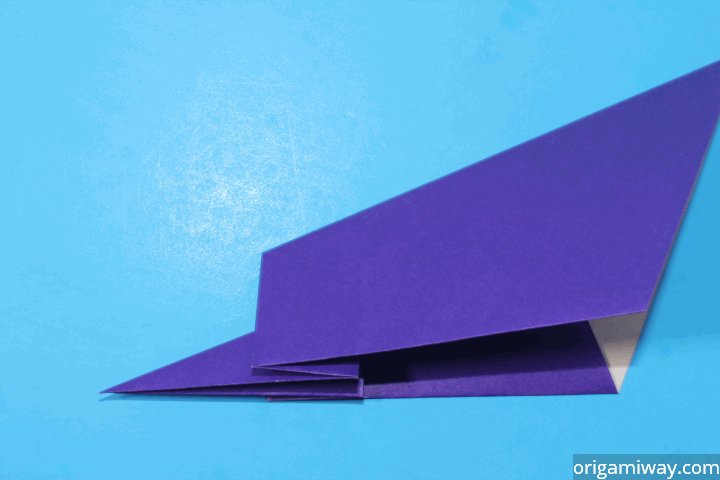The petal fold complete. Crease heavily and unfold.

Origami For Dummies What You Should Know
Now we just fold in half to close the model.

Origami double reverse fold. This is a valley fold – all layers together ie. This technique is being frequently used for many origami models. A closed black arrow indicating directionality.
In a tessellated fold pattern this limits the number of folds meeting at a vertex to six. Fold and combine circular paper to make two dimensional images of animals flowers faces objects. This technique is being frequently used for many origami models.
The second catastrophe geometry the Cusp manifold is the equivalent in flat folding of the reverse fold. The origami inside reverse fold is a technique that is often used in origami. An inside reverse fold is.
It is essential to know how to apply this folding technique. It consists of four fold lines meeting at a vertex. Double-sided origami papers provde different yet complimentary patterns on the front and the reverse of the sheet.
It is essential to know how to apply this folding. The effects of the differing colors makes your origami folding pop. This fold changes the direction of the paper.
Inside reverse folds are very common especially when making the head or a tail of an origami bird or other animal. This step is somewhat optional. ROUND ORIGAMI PAPER Circle Paper Circle Sizes from 35 cm to 14 cm diameter Assorted colours white on reverse.
This page is for those who want the instructions to apply an outside reverse-fold in origami. It is used to narrow a triangular flap to produce a much thinner flap. In origami the inside reverse fold is shown with.
In particular the head of the bird is often folded-in so it is sandwiched in between outer layers of paper. Third the Swallowtail manifold is the equivalent of the double reverse fold. Repeat the front foot fold behind.
It has no cusp point. And fourth the Butterfly manifold the triangular sink fold. There is no known connection between Renaissance napkin-folding and the Japanese paper-folding tradition but cloth napkin folding is arguably as old as the Japanese art of origami itself.
A good way to introduce young children to paper folding. The finished Double Rabbit Ear. Origami researcher Joan Sallas has traced European napkin folds back to the 1600s including the first recorded use of the terms Mountain Fold and Valley Fold in this context.
This fold allows the paper to change directions. Origami Inside Reverse Fold Step 1. Origami Inside Reverse Fold Step 2.
And this is the secret – perform a petal fold. This page is for those who want the instructions to apply an inside reverse-fold in origami. The result of the inside reverse fold.
In this study only double-reverse folds are considered. The crease in step 3 should make it easier to complete the Double rabbit ear fold. To practise this fold here is a variation of a traditional origami swan.
This basic origami move allows the model to be more stable and secure so it does not unravel by itself. The first thing to do is to make a mountain fold. It is commonly used in making the head of a bird or the feet of animals.
Similar to the outside reverse fold the inside reverse fold is very easy to do and understanding this basic origami folding technique will help you immensely. In origami the outside reverse fold is shown with a valley fold line dashed line a closed black arrow denotes valley fold and an open white arrow denotes mountain fold. Then try which is a mountain fold with all layers together see above diagram.
How to apply an Inside reverse-fold in origami Hyo AhnInside reverse-fold is a fundamental folding technique used in origamiOne should know what it is and. Inside reverse-fold is always applied to a folded corner flap. Choose from a large selection of different patterns and color combinations including.
In 3D folding the fold line of the Fold manifold takes the form of a curve. Origami Inside Reverse Fold. When you make a mountain fold on one side that same fold is a valley fold.
If we wish to fold but between layers 1 and 2 we have a reverse fold. Valley fold the small triangle above the head the frill in half. The a reverse fold is the basic element of the cylindrical origami patterns.
A b Figure 3. It reverses the face of the corner flap to show the inside of the flap. 2 is put over P.
It is a good way to create thin legs on an animal. Double reverse fold the tail bringing it back up close to horizontal. A mountain fold line dash-dot-dot line a broad arrow push in action and.
Inside Reverse Fold The Inside Reverse Fold is commonly seen in the making of origami birds. Unfold the rabbit ear which forms the frill point folded. Origami Inside Reverse Fold.
It reverses the face of the corner flap to the outside direction. We begin the double rabbit ear fold by performing an inside-reverse fold. Crease well and unfold.
The trick is to now look at the model at a 90 degree angle as shown in the picture. Floral prints double-sided foil origami paper kusudama kits solid color origami and yuzen chiyogami papers. Reverse fold the tip of the front foot in to shorten it.
Outside reverse-fold is always applied to a folded corner flap. It is used regularly when making the head of a bird or the feet of an animal.
Read more











